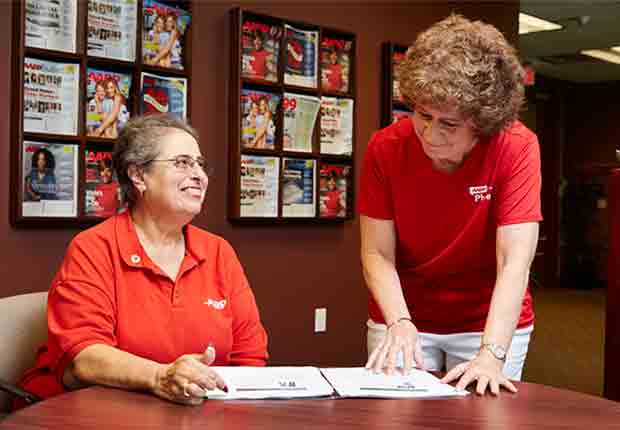AARP Hearing Center

By Miriam Davidson
Virginia Brant, 71, used to put on forums in inner-city neighborhoods with local celebrities, such as Phoenix Suns basketball players, urging kids to stay in school.
Today, she organizes town hall meetings around the state and testifies frequently before the Arizona State Legislature on behalf of family caregivers.
“I started out advocating for children and ended up advocating for seniors,” said Brant, of Glendale, a former specialist on dropout prevention who has been an AARP volunteer for about 10 years.
Brant knows what it’s like to be a family caregiver. She has cared for her mother, who had dementia, before she died, and her husband, who died of liver cancer, as well as for two disabled grandsons and other relatives.
And Brant did all this while dealing with her own diagnosis of multiple sclerosis.
“The things that happen to you in your life, you understand what God was preparing you for,” she said.
Brant and other AARP volunteer advocates will be back before the Legislature when the next session starts Jan. 11, fighting for policies and services designed to help older people stay in their own homes and communities.
One of their top priorities will be the CARE (Caregiver Advise, Record, Enable) Act, which would require hospitals to show a family caregiver how to perform medical tasks such as wound care before sending a patient home, among other assistance.
Some version of that law has been adopted in 18 states and is under consideration in at least a dozen others.
Supporters say the CARE Act may reduce return trips to the hospital. The federal Centers for Medicare & Medicaid Services (CMS) estimates that $17 billion in Medicare funds is spent each year on unnecessary hospital readmissions. Last year, CMS penalized 62 percent of Arizona hospitals for excessive readmissions.
In some other states, hospital associations have testified in favor of the CARE Act. In Arizona, however, hospitals have been focused on Medicaid expansion issues and have not been receptive to taking up the act. But AARP officials and volunteers hope to build support for the proposal this session.
“It’s absolutely critical that caregivers are provided with appropriate resources and education to be able to care for a loved one at home,” said Dana Marie Kennedy, AARP state director.
Overseeing in-home care
AARP Arizona also supported new regulations, signed into law in April, that require nonmedical in-home care agencies to annually disclose information on background checks, training, cost of services and hiring and firing policies.
Advocates say these requirements are a good start, but point out that the law does not require verification of data reported by in-home agencies, does not establish a central database and initiates investigations only after consumers complain.
AARP Arizona continues to work to strengthen in-home care agency regulations, including mandatory training and background checks for in-home workers.
The organization also supports efforts by state Rep. Kate Brophy McGee (R-Phoenix) to fund the Lifespan Respite Care Program, which would make $250,000 available statewide each year for much-needed breaks for family caregivers.
“This is a cost-effective, small-government solution to an ongoing problem,” Brophy McGee said. “Long-term costs are lower when we provide respite care for caregivers so their loved ones can stay home.”
AARP Arizona has several other legislative priorities: protecting public and private pension plans; advocating before the Arizona Corporation Commission for safe, reliable and affordable public utilities; and fighting predatory lending by ensuring that interest rates are limited and loans are reasonably structured.
To become a volunteer advocate, contact AARP Arizona at 866-389-5649 toll-free or aarpaz@aarp.org.
Miriam Davidson is a writer living in Tucson.































































